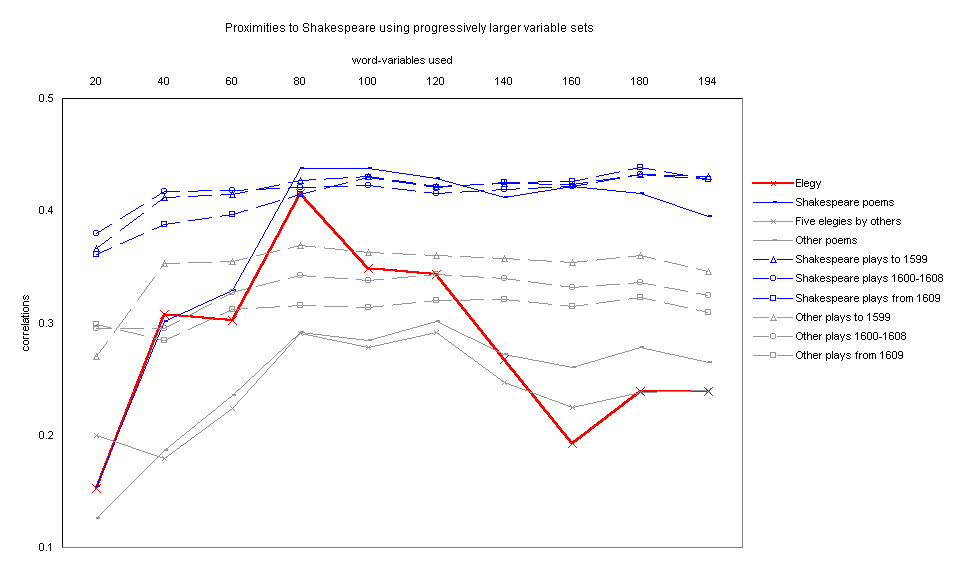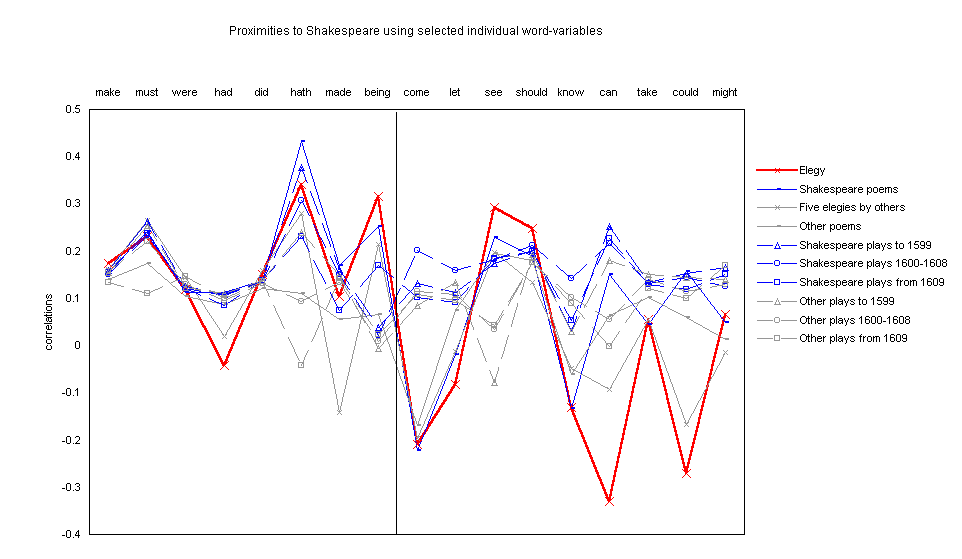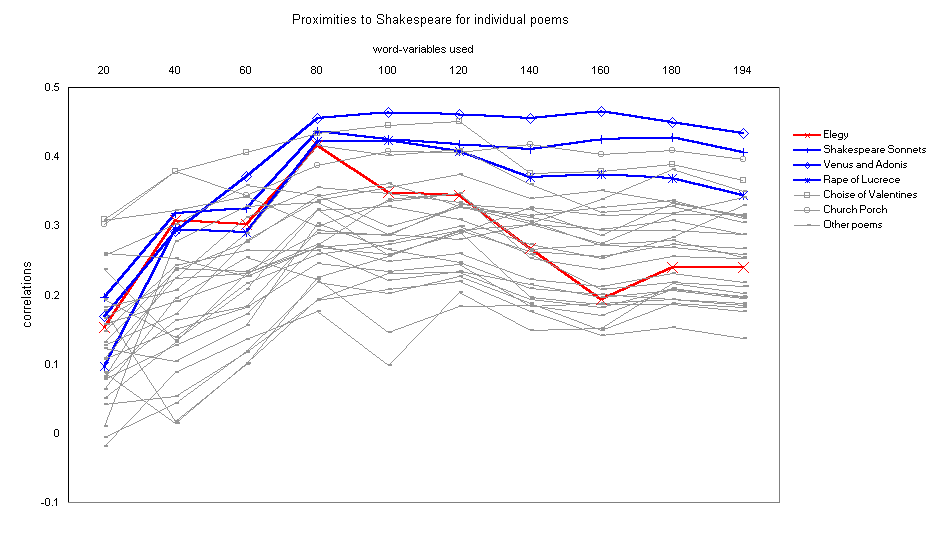
Common-words frequencies, Shakespeare's style, and the Elegy
by W. S.: figures and tables
Hugh Craig
University of Newcastle, New South Wales
Hugh.Craig@newcastle.edu.au
Craig, Hugh. "Common-words frequencies, Shakespeare's style, and the Elegy by W. S.: figures and tables". Early Modern Literary Studies 8.1 (May, 2002): 3.1-42 <URL: http://purl.oclc.org/emls/08-1/craifigs.htm>.
Table 1
| Poems in the textbase | ||||
| Author | Year of Birth | Title | ||
| "W.S." | ?? | Elegy | ||
| Campion, Thomas | 1567 | Two Books of Airs, Book I | ||
| Carew, Thomas | 1595 | Poems (1640), first 25 | ||
| Chapman, George | ca. | 1560 | Epicede | |
| Chapman, George | ca. | 1560 | Hero and Leander | |
| Daniel, Samuel | 1562 | Delia | ||
| Donne, John | 1572 | section of Poems | ||
| Donne, John | 1572 | First Anniversary | ||
| Donne, John | 1572 | Second Anniversary | ||
| Drayton, Michael | 1563 | Endimion and Phoebe | ||
| Fulke Greville | 1554 | Treatise of Religion | ||
| Herbert, George | 1593 | The Church-Porch | ||
| Herbert, George | 1593 | The Church Militant | ||
| Herbert, George | 1593 | 20 from The Temple | ||
| Herbert, Mary | 1562 | Sonnets, 44-63 | ||
| Herrick, Robert | 1591 | Hesperides, 1-50 | ||
| Heywood, Thomas | ca. | 1570 | A Funerall Elegye | |
| Jonson, Ben | 1572 | The Forrest | ||
| Jonson, Ben | 1572 | The Famous Voyage | ||
| Lanyer, Aemilia | 1569 | "Eve's Apology", "Cookham" | ||
| Marlowe, Christopher | 1564 | Hero and Leander | ||
| Nashe, Thomas | 1567 | Choise of Valentines | ||
| Raleigh, Sir Walter | 1552 | Poems (not "Cynthia") | ||
| Shakespeare, William | 1564 | Sonnets | ||
| Shakespeare, William | 1564 | The Rape of Lucrece | ||
| Shakespeare, William | 1564 | Venus and Adonis | ||
| Sidney, Sir Philip | 1554 | Astrophel and Stella | ||
| Southwell, Robert | 1561 | St Peter's Complaint | ||
| Spenser, Edmund | 1552 | The Faerie Queene, Book 1, Cantos 1-3 | ||
| Webster, John | ? | 1582 | A Monumental Column | |
| Wroth, Lady Mary | ? | 1587 | Pamphilia to Amphilanthus, 1-48 | |
Table 2
| Plays in the textbase | ||
| Author | Title | Date (from Annals) |
| Beaumont, F and J. Fletcher | The Maid's Tragedy | 1610 |
| Beaumont, Francis | The Knight of the Burning Pestle | 1607 |
| Cary, Elizabeth | Mariam | 1604 |
| Chapman, George | The Revenge of Bussy d'Ambois | 1610 |
| Dekker, Thomas | A Shoemaker's Holiday | 1599 |
| Fletcher, John | Valentinian | 1614 |
| Fletcher, John and Massinger | The Bloody Brother | 1617 |
| Fulke Greville | Mustapha | 1596 |
| Goffe, Thomas | The Courageous Turk | 1619 |
| Greene, Robert | Friar Bacon and Friar Bungay | 1589 |
| Greene, Robert | I Selimus | 1592 |
| Heywood, Thomas | A Woman Killed with Kindness | 1603 |
| Jonson, Ben | The Case is Altered | 1597 |
| Jonson, Ben | Every Man in his Humour | 1598 |
| Jonson, Ben | Every Man out of his Humour | 1599 |
| Jonson, Ben | Cynthia's Revels | 1600 |
| Jonson, Ben | Poetaster | 1601 |
| Jonson, Ben | Sejanus his Fall | 1603 |
| Jonson, Ben | Volpone | 1606 |
| Jonson, Ben | Epicoene | 1609 |
| Jonson, Ben | The Alchemist | 1610 |
| Jonson, Ben | Catiline his Conspiracy | 1611 |
| Jonson, Ben | Bartholomew Fair | 1614 |
| Jonson, Ben | The Devil is an Ass | 1616 |
| Kyd, Thomas | The Spanish Tragedy | 1587 |
| Marlowe, Christopher | Dido, Queen of Carthage | 1586 |
| Marlowe, Christopher | I Tamburlaine the Great | 1587 |
| Marlowe, Christopher | The Jew of Malta | 1589 |
| Marlowe, Christopher | Doctor Faustus | 1592 |
| Marston, John | Antonio's Revenge | 1600 |
| Marston, John | Sophonisba | 1605 |
| Middleton, Thomas | The Phoenix | 1604 |
| Middleton, Thomas | A Trick to Catch the Old One | 1605 |
| Middleton, Thomas | A Mad World, my Masters | 1606 |
| Middleton, Thomas | Michaelmas Term | 1606 |
| Middleton, Thomas | Your Five Gallants | 1607 |
| Middleton, Thomas | No Wit, no Help Like a Woman's | 1611 |
| Middleton, Thomas | A Chaste Maid in Cheapside | 1613 |
| Middleton, Thomas | The Witch | 1613 |
| Middleton, Thomas | More Dissemblers Besides Women | 1615 |
| Middleton, Thomas | Hengist, King of Kent | 1618 |
| Peele, George | King David and Fair Bethsabe | 1594 |
| Porter, Henry | Two Angry Women of Abingdon | 1598 |
| Rowley, William | A New Wonder, a Woman Never Vexed | 1611 |
| Rowley, William | All's Lost by Lust | 1619 |
| Shakespeare, William | King John | 1591 |
| Shakespeare, William | Richard III | 1592 |
| Shakespeare, William | The Comedy of Errors | 1592 |
| Shakespeare, William | Two Gentlemen of Verona | 1593 |
| Shakespeare, William | Love's Labours Lost | 1595 |
| Shakespeare, William | Richard II | 1595 |
| Shakespeare, William | Romeo and Juliet | 1596 |
| Shakespeare, William | The Merchant of Venice | 1596 |
| Shakespeare, William | I Henry IV | 1597 |
| Shakespeare, William | II Henry IV | 1597 |
| Shakespeare, William | The Merry Wives of Windsor | 1597 |
| Shakespeare, William | Henry V | 1599 |
| Shakespeare, William | Julius Caesar | 1599 |
| Shakespeare, William | Hamlet | 1601 |
| Shakespeare, William | Twelfth Night | 1601 |
| Shakespeare, William | Troilus and Cressida | 1602 |
| Shakespeare, William | All's Well that Ends Well | 1603 |
| Shakespeare, William | Measure for Measure | 1604 |
| Shakespeare, William | Othello | 1604 |
| Shakespeare, William | King Lear | 1605 |
| Shakespeare, William | Antony and Cleopatra | 1607 |
| Shakespeare, William | Coriolanus | 1608 |
| Shakespeare, William | Cymbeline | 1609 |
| Shakespeare, William | The Winter's Tale | 1610 |
| Shakespeare, William | The Tempest | 1611 |
| Tourneur, Cyril | Atheist's Tragedy | 1611 |
| Webster, John | The White Devil | 1612 |
| Webster, John | The Duchess of Malfi | 1614 |
| Wilmot, Robert, and others | Tancred and Gismund | 1591 |
| Wilson, Robert | The Three Ladies of London | 1581 |
Table 3
Word-types counted
In ascending order of number of zero counts in select set
(and descending order of frequency
in full set)
1-10
the and I of a is it in(p)
to(i) to(p)
11-20 not will(v)
with be he his but this have for(p)
21-30 as him all
thou what are thy that(d) do shall
31-40 if now
by(p) that(c) or we(tp) they thee no(adj)
she
41-50 her(adj) so(ad)
at from would was their then here
there
51-60 how more
them which(r) our(tp) on(p) well when
one may
61-70 for(c) yet
make must were had such us(tp) did
hath
71-80 where these
some an like(p) most time made being
who(r)
81-90 though you
that(r) good o come let love so(am)
see
91-100 should than know
can too take nor could might many
101-110 my me upon(p) out
up(a) much life men thus so(c)
111-120 fair your give think
doth cannot down live her(pp) man
121-130 why say tell great
again away been done thine look
131-140 who(int) hear go mine(adj&pp)
art(v) in(a) back unto himself am
141-150 above speak on(a) will(n)
through having myself soon themselves lord
151-160 dost thyself no(e) shalt
dare wilt over under by(a) canst
161-170 itself king herself
methinks like(v) like(n) sir ye aye
to(a)
171-180 yours yourself ourselves
for(a) son wouldst like(a) shouldst art(n)
mayst
181-190 yourselves self today
does tomorrow has durst sirra wert which(int)
191-194 upon(a) doing wast
ours(tp)
Word-types with more than fifty-four zero counts:
195-200 our(rp) we(rp)
hers ought tonight couldst
201-210 darest us(rp) methought
theirs mightst its beest sire ours(rp) ourself
211-219 up(p) dared
selves methoughts mought mine(n) mowe oughtst
wolle
Abbreviations: (a) adverb, (adj) adjective, (adj&pp) adjective and
personal pronoun, (ad)
adverb of degree, (am) adverb of manner, (c) conjunction , (d) demonstrative,
(e)
exclamation, (i) infinitive, (int) interrogative, (n) noun, (p) preposition,
(pp) personal
pronoun, (r) relative, (rp) royal plural, (tp) true plural, (v) verb.
Table 4
| Comparison of t-test probabilities for common-words variables | ||||||||||||
| Notes: Low values indicate marked differences between Shakespeare and non-Shakespeare texts. | ||||||||||||
| Equal variances are not assumed. | ||||||||||||
| set 1 (variables chosen by Foster) | set 2 (rejected by Foster) | |||||||||||
| and | but | not | so | that | most | like | by | in | to | with | ||
| plays | 0.72 | 0.21 | 0.02 | 0.15 | 0.14 | 0.12 | 0.16 | 0.00 | 0.31 | 0.46 | 0.80 | |
| poems | 0.10 | 0.44 | 0.64 | 0.18 | 0.88 | 0.35 | 0.48 | 0.42 | 0.67 | 0.75 | 0.16 | |
| all texts | 0.13 | 0.04 | 0.00 | 0.50 | 0.77 | 0.19 | 0.81 | 0.11 | 0.49 | 0.19 | 0.94 | |
| t-test means: | set 1 | set 2 | ||||||||||
| plays | 0.22 | 0.39 | ||||||||||
| poems | 0.44 | 0.50 | ||||||||||
| all texts | 0.35 | 0.43 | ||||||||||
Table 5
| Foster, Elegy, Table 1.17 (p. 144). Retyped. |
| . |
combined works
|
probable range
|
control group
|
most probable
|
. | ||||
| . |
low
1
|
high
2
|
low
3
|
high
4
|
low
5
|
high
6
|
low
7
|
high
8
|
Elegy
9
|
| and |
TGV
24.1
|
H5
38.4
|
23.6
|
37.6
|
Cym.
24.5
|
Tmp.
29.6
|
24.3
|
29.3
|
109
25.2
|
| but |
Lr
5.1
|
MM
9.3
|
5.6
|
10.1
|
Tmp.
7.0
|
WT
9.1
|
7.6
|
9.9
|
37
8.6
|
| not |
H5
7.9
|
JC
13.4
|
6.2
|
10.5
|
Tmp.
9.7
|
WT
12.4
|
7.6
|
9.7
|
41
9.5
|
| so |
Wiv.
4.7
|
WT
7.9
|
5.9
|
9.9
|
Cor.
5.1
|
WT
7.9
|
6.4
|
9.9
|
28
6.5
|
| that |
Wiv.
9.8
|
TGV
16.9
|
11.9
|
20.4
|
Tmp.
11.8
|
Cym.
13.6
|
14.3
|
16.5
|
62
14.4
|
Table 6
| "Shakespearean" ranges for eleven common-words variables |
| Notes: Format is based on Foster, Elegy, Table
1.17. Rounded values as shown are used for calculations. Base counts are from the textbase compiled by the present author. Ranges on which the Elegy "passes" are shaded in blue. |
| . |
combined works
|
.
|
probable range
|
.
|
control group
|
.
|
most probable
|
.
|
x
|
||||||
|
p/d
ratio |
low
1 |
high
2 |
low
3 |
high
4 |
low
5 |
high
6 |
low
7 |
high
8 |
Elegy
9 |
||||||
| and |
1.03
|
TGV
23.8 |
H5
36.8 |
24.5
|
37.9
|
Cym.
24.2 |
Tmp.
29.1 |
24.9
|
30.0
|
108
25.0 |
|||||
| but |
1.10
|
Lr
4.9 |
MM
9.2 |
5.4
|
10.1
|
Tmp.
7.0 |
WT
9.0 |
7.7
|
9.9
|
38
8.8 |
|||||
| not |
0.75
|
H5
7.8 |
JC
13.3 |
5.9
|
10.0
|
Tmp.
9.6 |
WT
12.2 |
7.2
|
9.2
|
41
9.5 |
|||||
| so |
1.25
|
Wiv.
4.6 |
WT
7.8 |
5.8
|
9.8
|
Cor.
5.0 |
WT
7.8 |
6.3
|
9.8
|
28
6.5 |
|||||
| that |
1.17
|
Wiv.
10.9 |
TGV
18.0 |
12.8
|
21.1
|
Cor.
12.5 |
Cym.
14.0 |
14.6
|
16.4
|
62
14.4 |
|||||
| . | |||||||||||||||
| most | 0.57 | . |
Wiv.
0.4 |
Ham.
2.7 |
.
|
0.2
|
1.5
|
.
|
Cym.
1.7 |
Tmp.
2.6 |
.
|
1.0
|
1.5
|
.
|
11
2.5 |
| like | 1.67 |
Oth.
0.8 |
Ham.
2.5 |
1.3
|
4.2
|
WT
1.7 |
Cor.
2.2 |
2.8
|
3.7
|
8
1.9 |
|||||
| by | 1.19 |
Wiv.
3.0 |
R III
6.0 |
3.6
|
7.1
|
Cor.
3.9 |
WT
5.0 |
4.6
|
6.0
|
41
9.5 |
|||||
| in | 1.28 |
WT
10.2 |
H V
16.6 |
13.1
|
21.2
|
WT
10.2 |
Cor.
13.5 |
13.1
|
17.3
|
138
32.0 |
|||||
| to | 1.05 |
H IV
118.4 |
MM
26.6 |
19.3
|
27.9
|
Tmp.
18.6 |
Cor.
26.0 |
19.5
|
27.3
|
132
30.6 |
|||||
| with | 1.42 |
AW
6.6 |
R II
10.5 |
9.4
|
14.9
|
Cym.
7.7 |
Cor.
9.7 |
10.9
|
13.8
|
25
5.8 |
|||||
Table 7
| Passes and fails for nine poems using the Shakespeare "most probable frequency" range | |||||||||
| Elegy | Venus and Adonis | Rape of Lucrece | Shakes. Sonnets | Heywood Elegy | Webster Elegy | Chapman Epicede | First Anniv. | Second Anniv. | |
| and | p | f | p | p | p | f | f | f | f |
| but | p | p | f | p | f | f | f | f | f |
| not | f | p | f | f | p | p | f | f | f |
| so | p | p | p | p | f | p | p | p | f |
| that | f | f | p | f | p | f | f | f | f |
| most | f | f | f | f | f | f | f | p | f |
| like | f | f | p | f | f | f | p | f | f |
| by | f | p | f | p | f | f | f | p | p |
| in | f | p | p | f | p | f | f | p | p |
| to | f | f | p | p | f | f | p | p | p |
| with | f | p | f | f | f | f | f | f | f |
| passes overall | 3 | 6 | 6 | 5 | 4 | 2 | 3 | 5 | 3 |
| passes in first 5 | 3 | 3 | 3 | 3 | 3 | 2 | 1 | 1 | 0 |
Figure 1

Figure 2

Figure 3
